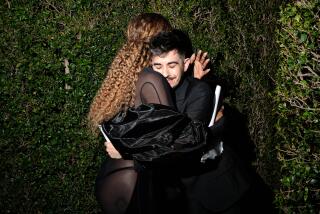Haden shares resonant stories
- Share via
There may be no greater ambassador for jazz these days than L.A.’s adopted son Charlie Haden. Haden’s nearly 40-year career has encompassed such genres as free jazz, Portuguese fado and vintage country -- the last of which is featured on his latest album, “Rambling Boy” -- not to mention a consistently revolving roster of sidemen and bandleaders that reads like a list from some imaginary jazz hall of fame.
But Haden is first and foremost a music fan, no different from the people who turned up for the recently opened Grammy Museum’s second evening of conversation and performance (Brian Wilson was the subject of the first). And that’s what made his conversation with museum executive director Robert Santelli so memorable Wednesday night as Haden told story after story from jazz’s most fertile period.
At one point, Haden remembered his first divergence from what he called “hillbilly music,” when his father took him backstage to meet Charlie Parker’s band in Omaha. A proud and well-mannered Midwesterner, Haden described breathlessly telling the band how much he wanted to play like them, which culminated in his being invited back to the band’s hotel room.
Barely a teenager, the budding bassist approached the smoky room (“I never smelled nothing like that before!” he grinned) only to be warned by one player, “Kid, you want to end up like this?” Haden nodded furiously, “Yeah!”
Outside of an opening clip from a new Swiss-made documentary on the making of Haden’s latest album (screening at REDCAT on Feb. 12), much of the evening played out like a vividly drawn trip through L.A.’s rich jazz history. Hearing Haden speak about sitting in with Art Pepper in East L.A. and first meeting Ornette Coleman at the Hillcrest Club (“It was like being born again”), it was hard not to feel a little wistful that this was the only chat of its kind scheduled as part of the Duke Jazz Talk series, which ordinarily takes place at New York’s Lincoln Center.
When Santelli pressed Haden to name some current favorite players, the bassist and composer turned the conversation back to another story from his past, this time about the late bassist Scott LaFaro.
When asked about the state of jazz, Haden replied simply, “I don’t see music in categories anymore,” which isn’t a surprising sentiment from someone who once organized a bill with San Pedro jazz-punks the Minutemen after hearing them through his son Josh (“I had a new audience!” he said excitedly).
At the close of the Q&A;, Haden took the stage with his collaborator Alan Broadbent on piano -- the perfect showcase for the bassist’s rich and elegant tone. With the red stage lights reflected on Haden’s glasses, the duo hit their stride with a swirling take on Coleman’s classic “Lonely Woman.”
While Broadbent occasionally reached into the piano to pluck gingerly at its strings, Haden’s solo alternated between melodic warmth and aggression as his fingers fanned across the strings, still finding unexplored corners in the once-controversial piece. Even after 40 years, it still may be “The Shape of Jazz to Come.”
--
More to Read
The biggest entertainment stories
Get our big stories about Hollywood, film, television, music, arts, culture and more right in your inbox as soon as they publish.
You may occasionally receive promotional content from the Los Angeles Times.











